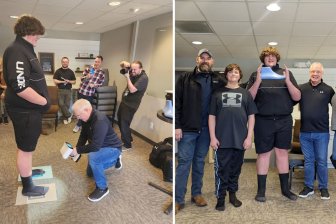The interim RCMP commissioner and the head of the Nova Scotia RCMP say they’re committed to review the recommendations in a scathing final report from the Mass Casualty Commission, but both admit they haven’t read the document.
“As police officers, we bear tremendous responsibility to keep the people and communities safe. The April 2020 mass casualty event was something we had never seen before in Canada, and I can’t even imagine what you have endured,” said RCMP Commissioner Mike Duheme, during a media availability in Truro, N.S. on Thursday afternoon.
“The RCMP is fully committed to rebuilding the trust and confidence of Nova Scotians as part of these efforts. We must ensure that the vital work of the Commission will last a lasting impact on public safety locally, nationally and internationally.”
Read more:
‘There were failures’: N.S. shooting inquiry report slams RCMP response to 2020 tragedy
Duheme said there’s a team at the RCMP going through the report, released today, and that an action plan will be tabled.
“We will be reporting of the progress on an outward facing website in which the population can see the progress that the RCMP is doing. I think that’s a good form of accountability,” he said.
When pressed by reporters, who pointed out that the RCMP received an advanced copy of the report on Wednesday morning, Duheme reiterated he had not read the report, nor was he certain if his team received the full version or executive summary ahead of time.
“I haven’t seen any of the recommendations,” he said.
“I haven’t gone through the recommendations just yet. Doesn’t minimize the impact of what took place. I just haven’t had time to go through the recommendations.”
Dennis Daley, the commanding officer of the Nova Scotia RCMP and interim RCMP Commissioner Mike Duheme speak at a new conference following the release of the Mass Casualty Commission report on March 30, 2023.
Alex Cooke/Global News
Duheme was recently named interim commissioner, after Brenda Lucki retired from the job two weeks ago. Lucki had faced intense criticism for the RCMP’s handling of multiple crises, including the mass shooting in Nova Scotia.
Duheme’s comments Thursday came after the Mass Casualty Commission publicly released its findings — totalling more than 3,000 pages, which resulted from 76 days of public hearings. The wide-ranging report examined the April 2020 rampage, which claimed the lives of 22 people and was committed by a gunman who was dressed as an RCMP officer and driving a replica cruiser.
It touched on a variety of issues, including the police response, the killer’s access to firearms and the steps taken to inform the public as the rampage unfolded.
The report detailed the RCMP’s various failures in preventing, responding to, and reacting in the aftermath of the tragedy, and said the institution as a whole needs to be re-examined.
“There were many warning signs of the perpetrator’s violence and missed opportunities to intervene in the years before the mass casualty. There were also gaps and errors in the critical incident response to the mass casualty as it unfolded,” the report said.
“Additionally, there were failures in the communications with the public during and in the aftermath of the mass casualty.”
The commission’s final report included 130 recommendations, 75 about policing. One of the recommendations called for the federal minister of public safety to commission an in-depth, external and independent review of the RCMP. Another recommendation suggested “modernizing” police education by scrapping the depot model of RCMP training by 2032.
Read more:
A look at the 22 Nova Scotians killed in Canada’s worst mass shooting
Assistant Commissioner Dennis Daley, the commanding officer of the Nova Scotia RCMP, said he hadn’t read the recommendations either.
During his remarks, he said he wanted the victims, families and survivors to know that he was sorry “for the pain and trauma you have suffered.”
“Individuals who responded in April 2020 did their best while putting the safety and well-being of others ahead of their own,” he said. “But I know our response wasn’t what you needed it to be, and for that I am deeply sorry.”
He went on to say that while RCMP “can’t change what happened in 2020,” they can learn and improve.
“We are here today with a promise to act on the MCC’s recommendations in a manner that is transparent to the victims, survivors and their families,” said Daley.
“With any review, areas for improvement are identified, but I want Nova Scotians and all Canadians to know that we did not wait for the release of today’s MCC report to make important changes.”

He pointed out that Nova Scotia RCMP has “enhanced resourcing” for the emergency response team, invested in new equipment and opened a state-of-the-art operational communication centre. As well, Daley said the RCMP in the province has added protocols around critical incident command and “changed our approach” to using emergency alerts.
“These are a few examples of the many changes we have already implemented and we are fully committed to more change informed by the MCC report and in collaboration with our partners in policing, public safety, community services and other areas,” he said.
— With files from Global News’ Alex Cooke and The Canadian Press
© 2023 Global News, a division of Corus Entertainment Inc.



